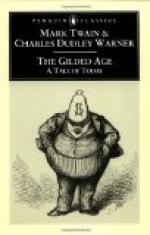Some instinct taught Washington that his present lack of money would be an obstruction, though possibly not a bar, to his hopes, and straightway his poverty became a torture to him which cast all his former sufferings under that held into the shade. He longed for riches now as he had ever longed for them before.
He had been once or twice to dine with Col. Sellers, and had been discouraged to note that the Colonel’s bill of fare was falling off both in quantity and quality—a sign, he feared, that the lacking ingredient in the eye-water still remained undiscovered—though Sellers always explained that these changes in the family diet had been ordered by the doctor, or suggested by some new scientific work the Colonel had stumbled upon. But it always turned out that the lacking ingredient was still lacking—though it always appeared, at the same time, that the Colonel was right on its heels.
Every time the Colonel came into the real estate office Washington’s heart bounded and his eyes lighted with hope, but it always turned out that the Colonel was merely on the scent of some vast, undefined landed speculation—although he was customarily able to say that he was nearer to the all-necessary ingredient than ever, and could almost name the hour when success would dawn. And then Washington’s heart world sink again and a sigh would tell when it touched bottom.
About this time a letter came, saying that Judge Hawkins had been ailing for a fortnight, and was now considered to be seriously ill. It was thought best that Washington should come home. The news filled him with grief, for he loved and honored his father; the Boswells were touched by the youth’s sorrow, and even the General unbent and said encouraging things to him.—There was balm in this; but when Louise bade him good-bye, and shook his hand and said, “Don’t be cast down—it will all come out right—I know it will all come out right,” it seemed a blessed thing to be in misfortune, and the tears that welled up to his eyes were the messengers of an adoring and a grateful heart; and when the girl saw them and answering tears came into her own eyes, Washington could hardly contain the excess of happiness that poured into the cavities of his breast that were so lately stored to the roof with grief.
All the way home he nursed his woe and exalted it. He pictured himself as she must be picturing him: a noble, struggling young spirit persecuted by misfortune, but bravely and patiently waiting in the shadow of a dread calamity and preparing to meet the blow as became one who was all too used to hard fortune and the pitiless buffetings of fate. These thoughts made him weep, and weep more broken-heartedly than ever; and be wished that she could see his sufferings now.
There was nothing significant in the fact that Louise, dreamy and distraught, stood at her bedroom bureau that night, scribbling “Washington” here and there over a sheet of paper. But there was something significant in the fact that she scratched the word out every time she wrote it; examined the erasure critically to see if anybody could guess at what the word had been; then buried it under a maze of obliterating lines; and finally, as if still unsatisfied, burned the paper.




